new posts in all blogs
Viewing: Blog Posts Tagged with: blogosphere, Most Recent at Top [Help]
Results 1 - 25 of 450
How to use this Page
You are viewing the most recent posts tagged with the words: blogosphere in the JacketFlap blog reader. What is a tag? Think of a tag as a keyword or category label. Tags can both help you find posts on JacketFlap.com as well as provide an easy way for you to "remember" and classify posts for later recall. Try adding a tag yourself by clicking "Add a tag" below a post's header. Scroll down through the list of Recent Posts in the left column and click on a post title that sounds interesting. You can view all posts from a specific blog by clicking the Blog name in the right column, or you can click a 'More Posts from this Blog' link in any individual post.
Well, I've waited around a long time for this, and I couldn't be more thrilled... Zero Books have announced the forthcoming publication of my wonderfully talented friend Stephen Mitchelmore's This Space of Writing:
What does 'literature' mean in our time? While names like Proust, Kafka and Woolf still stand for something, what that something actually is has become obscured by the claims of commerce and journalism. Perhaps a new form of attention is required. Stephen Mitchelmore began writing online in 1996 and became Britain's first book blogger soon after, developing the form so that it can respond in kind to the singular space opened by writing. Across 44 essays, he discusses among many others the novels of Richard Ford, Jeanette Winterson and Karl Ove Knausgaard, the significance for modern writers of cave paintings and the moai of Easter Island, and the enduring fallacy of 'Reality Hunger', all the while maintaining a focus on the strange nature of literary space. By listening to the echoes and resonances of writing, this book enables a unique encounter with literature that many critics habitually ignore. With an introduction by the acclaimed novelist Lars Iyer, This Space of Writing offers a renewed appreciation of the mystery and promise of writing.

By:
Roger Sutton,
on 5/18/2015
Blog:
Read Roger - The Horn Book editor's rants and raves
(
Login to Add to MyJacketFlap)
JacketFlap tags:
Featured,
book club,
march madness,
Lolly's Classroom,
all levels,
young adult,
School,
Picture Books,
middle grade,
blogosphere,
Elementary,
Add a tag
It was the best of times; it was the worst of times. A fresh, clean bracket has names neatly penciled into open slots, representing optimism and promise for excitement. Meanwhile, the sweetness of the beginning is quickly thrown into tumult, as surprises abound and unpredicted losses become the talk of Twitter. The competition is fierce, and the stakes are high. Naturally, I’m talking about March Picture Book Madness!
I was scouring through my daily dose of teacher blogs (a heavily addicting recreational activity, though I highly recommend it) when I came across an article in one of my absolute favorites. The Nerdy Book Club (yes, that’s its real name) was advocating for countrywide participation in a March Madness book battle. Over 700 schools across the US were putting in their picks for top-seeded picture books, middle grade novels, or young adult fiction. The website would then generate a bracket, with classrooms everywhere participating in the “madness!” My class just had to get in on all the fun — what an exciting excuse to indulge into picture books, and providing a fun incentive for read-aloud time!
Worried that your school may not have the funds to take on this challenge? Have no fear! Our grade level team didn’t enter the actual pool. We decided to use the list of books selected on the website as guide, and see which ones we could find in our school library. For ones that we could not find, we simply supplemented with other incredible picture books that we found! I put on my artistic hat and created my own bracket out of a large piece of card stock.
Just as the March Madness basketball brackets stem from different regions, the picture book bracket had two distinct categories: books written prior to 2014, and books written throughout the 2014-2015 season. This created a wonderful opportunity for all of us to explore the latest in children’s literature, as well as revisiting some old favorites. Check out the picture below for our classroom picks (click to see it larger). I know we’re past March now, but the fervor is still in the air as we come to our top pick. I hope you’ll consider an activity like this next year as it really isn’t that maddening to organize!


The post Best book bracketology appeared first on The Horn Book.

By: Colleen Mondor,
on 3/10/2015
Blog:
Chasing Ray
(
Login to Add to MyJacketFlap)
JacketFlap tags:
Blogosphere,
Add a tag
While attending a large literary conference last year I approached a table for a popular lit site* and asked to speak with someone about submitting reviews. I was pointed in the direction of a nearby friendly editor who I introduced myself to and explained that I was a reviewer for Booklist and also the longtime YA columnist for Bookslut. "I would like to submit a review of some YA books with crossover appeal to your site," I explained, "and wondered if there was a specific person to whom I should direct my email."
"Oh, we don't run any teen book reviews," she replied. "Our readers aren't interested in those books. You can always submit to our general site email though and take a chance. Thanks for stopping by!"
And then she turned her back and starting speaking to someone else and I realized I was having one of those moments where someone dismisses you in a way that is acceptably rude but certainly feels lousy.
In the months after that interaction, I spent some time looking for lit sites that might be open to new YA submissions. I was picked up by LARB for a piece last fall and am now doing regular reviews for Locus (in print). Last month I finished a piece I've been wanting to write for a while about a YA series of NF science books though and emailed a query letter to another big lit site. The response was very polite, the editor was actually interested in the books for his kids, but again I was told that their readers are not interested in "these kinds of books". And that's when I got serious about seeing just what kind of books lit sites are reviewing.
There have been a zillion articles written about whether or not adults read YA; enough of them that I don't need to tackle that subject again. One thing no one does dispute is that people who visit lit sites are book readers and book lovers and while there have been no big surveys about whether or not these folks have children, I think it is safe to assume that a decent sized segment of the reading population are in fact parents and probably inclined to buy books for their kids.
I don't think I'm going far out on a limb when I suggest that perhaps these parents might want to know about a great book every now and again that might be enjoyed by their kids (or their nieces, nephews, cousins, godchildren or other young people in their lives). The assumption that appears to be widely made by the lit sites however is that their readers would prefer to find those type of book reviews (and the books themselves) elsewhere. I have no idea why they have come to this conclusion.
I suppose some site administrators do survey the specific post stats and can say that a YA book review receives fewer visitors than a comparable adult literary review. But honestly, that kind of analysis doesn't really impress me much as a reader. Stats can be driven by so many strange things (like controversy) and quantity does not necessarily mean quality.
In other words, 1,000 people might blow through a post, not read past the first few paragraphs and never think of the book again while 200 readers might read another post and all go out and buy the book or check it out from the library or mention it on social media. It's really tough to quantify the value of one visitor over another.
None of that is the point though as I don't think that potential stats are what drive the decision for lit sites to pass on YA book reviews. I think it is a lot more about not wanting to be perceived as a teen site or be associated with people who read or want or care about teen books. Lit sites want to be about certain books and the people who they think read those and all the rest, well, those are books for other kinds of readers.
Yeah, this is that dismissive part again.
While I am not a fan of casting a derisive eye on genre reading either, (I love a good fantasy, mystery or romance as much as anyone), the refusal to include at least occasional YA book reviews seems particularly shortsighted to me. It smacks of superiority, of more of that "serious readers vs everybody else" attitude that seems to lurk at the corners of far too many online literary conversations. It's like standing in a room with people who claim they were reading Dostoyevsky at age 12 as opposed to the likes of Harry Potter.
I never believe those people. (And honestly if it's true, it's deeply strange.)
The other day my 13 year old son finished reading the two Lockwood & Co. books by Jonathan Stroud and raved about them, insisting I give them a shot. I read both books, enjoyed the heck out of them, (great characters, wonderful world building, just the right dose of creepy mystery), and promptly emailed a cousin to suggest them for his son. I also made a note to buy them for my niece in a couple of years (she's a little young) and will be mentioning them to a sister-in-law for my nephew to read.
My son accomplished with his review exactly what lit sites are supposed to be about--to share good books with as many potential readers as possible. I'm not sure that most literary sites believe that anymore or rather, that they have narrowed their definitions of potential readers to a size that makes it too small for general readers (and book buyers) like me to feel welcome.
I'm going to send some queries out to a few science sites for the piece I have on those YA nonfiction books. I'm hoping it will have a better reception there.
*Nope, I'm not going to name names because then this becomes a big me vs them post and I just don't have the energy for that level of online dramarama right now.

Did I get tricked into running this somewhat non-slick infographic because The Beat is ranked #8 in a list of the top 100 comics blogs? You bet. But I did like that The Nib is #1. I think the chart went by Alexa rankings and it includes webcomics among the blogs, which doesn’t really make any sense. And essential sites like Comics Reporter, Robot 6, Comics Alliance, and about 800 more are missing. But anyway, talking points.
What do YOU think are the top comics sites? Besides the obvious—CBR, BC, Comicbook.com? Talk about it in the comments.

Ten years ago my dear friend Stephen Mitchelmore started his superb book blog This Space. It remains a vital inspiration, and the most essential book blog out there.
Recently, for a book project of my own that never got off the ground, I interviewed Steve. This Space's anniversary seems like an excellent time to publish it...

By:
Heidi MacDonald,
on 8/8/2014
Blog:
PW -The Beat
(
Login to Add to MyJacketFlap)
JacketFlap tags:
Interview,
podcast,
Interviews,
Comics,
Cartoonists,
Blogosphere,
Controversy,
Mike Dawson,
Indie Comics,
Top News,
Tumbling Tumblr Blogs,
more to come podcast,
Add a tag
 Recorded at Publishers Weekly, it’s More To Come, the weekly podcast of comics news, interviews and discussion with Calvin Reid, Kate Fitzsimons and The Beat’s own Heidi MacDonald.
Recorded at Publishers Weekly, it’s More To Come, the weekly podcast of comics news, interviews and discussion with Calvin Reid, Kate Fitzsimons and The Beat’s own Heidi MacDonald.
In this week’s podcast Heidi interviews comics creator, Tumblr personality and podcaster Mike Dawson, creator of Freddie & Me and Troop 142 about his trials as a mid-career creator, his recent Tumblr musings on the subject and the unexpected comics blogosphere notoriety that followed.
Download this episode direct here, listen to it in streaming here and catch up with our previous podcasts on the Publishers Weekly website, or subscribe to More To Come on iTunes
As I tried to make very clear in my post on Sunday, the small and contained argument that I'm advancing is not that serious and interesting writing about books is not happening online. Categorically, it is. I listed five blogs and bloggers in my original Guardian post – This Space, David Winters, 3:AM, Flowerville, Time's Flow Stemmed – and in my follow up blog, I listed several more – John Self, Berfrois, LARB and Dan Green. Very many more wonderful book-related spaces and places could be mentioned – The Quarterly Conversation and HTMLGiant both deserve a shout, as do Marooned Off Vesta, Infinite Patience and in lieu of a field guide. Without all this fine online work, the cultural landscape would be very much more bleak. Thank god for websites!
I'm really not sure how more clearly I can say this: I'm not saying interesting work is not going on; I'm not saying you can't find great writing about writing online; I'm simply pointing out the observable, and to me rather odd, fact that in very many other fields (all kinds of genre writing, political blogs, philosophy blogs, food writing etc, etc) a named individual of real skill has emerged from the blogosphere to change the debate in their respective fields. Richard Seymour fundamentally changed, and often set, the debate in his part of the Left. Graham Harman has changed the debate in Continental Philosophy regarding realism for good.
Or lets take the offline example of James Wood – via his 'criticism'/reviewing he has changed the conversation by banging on about e.g. Hysterical Realism or bringing our attention to Free Indirect Discourse. Sadly and strangely, nothing remotely like this has come out of the online conversation about books. Take also e.g. Blanchot's NRF monthly essays from back in the day – quietly and insistently his interventions changed the conversation, altered perceptions, re-routed thinking. The Blanchot example could perhaps be seen as being a little arcane, but I think it might be the best example. Blanchot's monthly essays – no requirement here whatsoever that the blogging should be daily or even weekly – slowly, via their form, percolated into the consciousness of literary France, and changed literary critical discourse for good.
Blogging has added more critical voices to the general clamour. Great. Good to have more voices, excellent to have more views. But neither in content or form has it substantively affected the wider book conversation. These days we just have lots more reviewers mimicking newspaper reviews. Plainly, noting this does not equate with suggesting in any way that blogging is dead, or that online writing is not a considerable cultural boon.
The question remains, however, why have no serious literary critics emerged, maintaining a blog, doing innovative work and gaining a following for that work and changing the wider conversation, as we have seen in plenty of other fields? Where are the lit-critical Jack Monroes, Graham Harmans, Paul Slaines, Richard Seymours, Ian Bogosts? I don't see them. And I regret the lack.
In the UK, one blogger, John Self, has become a talisman. John is a superb book reviewer. Everyone should read him. He writes straight up and down reviews in the broadsheet style, penetrating and amusing, incisive and witty, and he has rightly been embraced by the Guardian, and thousands of eager readers. He is a tremendously good writer. He is not, however, a literary critic, and his writing, on the blog, echoes the form and style of response we see every week in the newspapers. That is not a value judgment, it is a fact. And it echoes another fact: no literary critic has yet emerged from the blogosphere; no writer has yet emerged from the large and informed online writing community and changed the wider conversation about writing on writing.
You may well think that the world doesn't need literary critics. Fine response! You may well think that book reviewing suffices. It's an entirely valid point. You may well want to ignore my actual argument and tell me that great writing is happening online here, there and somewhere else. And, as I've stressed, I can only agree that it absolutely is. Wikipedia tells me the "term 'weblog' was coined by Jorn Barger on 17 December 1997." So blogging has been around for a long time. And blogging is just part of the wider online writing revolution, the vibrancy, breadth and depth of which can only be applauded; it astounds and amazes. But in very many other fields, writers have emerged from online and changed their respective fields for good. Particularly noteworthy, as I've said, is the rise and rise of speculative realism which has fundamentally changed the debate raging in modern European Philosophy and is setting the agenda for exciting work ahead. It's a wonder to behold. Has this happened in the field of literary criticism? No, it has not.

By:
Heidi MacDonald,
on 3/19/2013
Blog:
PW -The Beat
(
Login to Add to MyJacketFlap)
JacketFlap tags:
News,
Comics,
Manga,
Art,
Blogosphere,
Breaking News,
The Simpsons,
Bart Simpson,
mashup,
Art Comix,
Top News,
Tumbling Tumblr Blogs,
Akira,
James Harvey,
Ryan Humphrey,
Add a tag
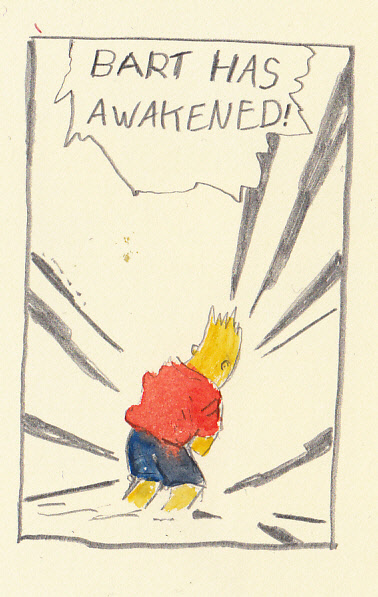
Ryan Humphrey posted this fantastic Simpson/Akira mash up comic on his tumblr last night and it’s been picking up a healthy number of notes since. The comic (which you can see below) is really striking, mainly, I think, because of those splashes of colour against that rich cream background, in the sense of drama and dynamism Humphreys evokes, and also in seeing the usually effusive Simpson’s characters strangely non-committal. The comic also struck a chord with artist James Harvey, who picked up the ball and ran with it, proposing to recreate the whole of Akira with The Simpsons cast, with artists who want to take part signing up to do particular sections. Here’s more from Harvey:
I took this idea to him (Ryan Humphrey), he gave it the go-ahead. Milhouse is Kaneda. Lisa is Kei. Bart is Tetsuo. Let’s do it.
I figured it all out. If you’re down, email the address below. In a few days, I’ll send you the cast list (which character from the Simpsons is which Akira character, though the minor characters will be left up to you) and I’ll tell you which 5 pages you’ll be working on. You can request a particular page, but it’s first come, first served.
If 468 people take part, we get to do all six volumes. Even if only 78 are down, we’d still get the entire first volume.
Since it’ll be non-profit, parody/satire, crowdsourced and distributed peer-to-peer, I feel like it’s juuust on the right side of the legal grey area it inhabits. If not- let’s do it anyway. I’ll take the rap.
if you want to be a part of this, drop me a line at [email protected]
I’m interested to see how this goes: it sounds hugely fun. Often comic jams on the internet throw up some fantastic stuff, with artists putting their own interpretations on things and a host of styles and techniques on display. If you’re interested in taking part, contact James at the email address above. Or just enjoy the comic like I did.
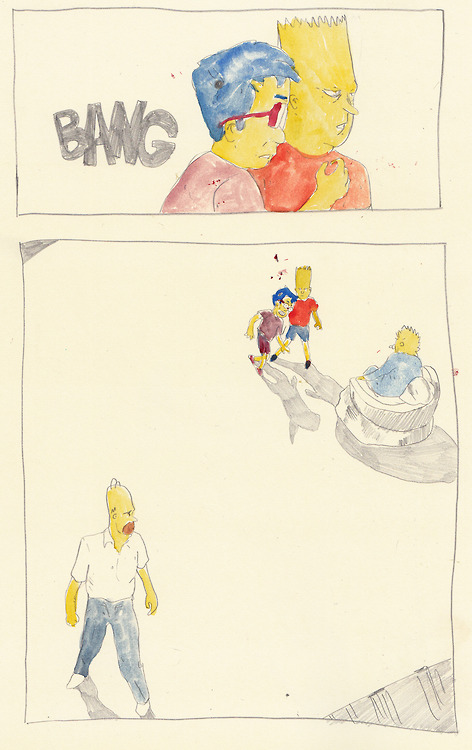
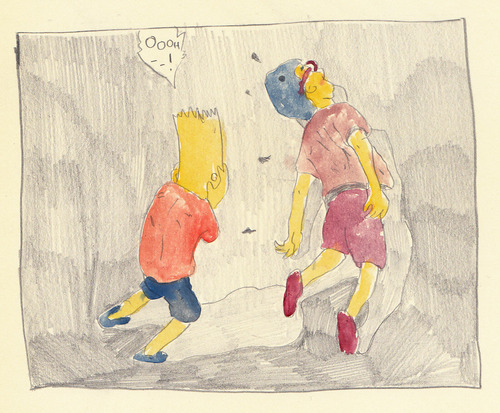

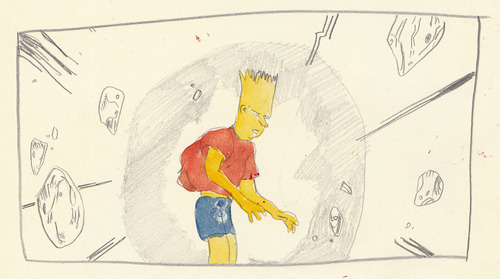
TweetAt the risk of lowering the tone, I relay to you the news of Jane Mai’s Poop Nightmare: so bad it needed capitalization As someone who lives in an old Victorian house, I can say with the weight of experience that there’s nothing worse than burst pipes, leaky drainage and overflowing toilet: the water seeps everywhere [...]
It’s often unclear whether Ulven’s voices are meant to be many, or one. They certainly speak and think of similar things. Like Beckett’s creations, all are crippled, decrepit, or otherwise waning. Decay, says one, is the “lowest multiple,” which may be why these characters seem to converge. In their infirmity, each shares something essentially human. As it’s put at one point, “people are only really revealed in decline.” Yet if decay and decline disclose the human condition, they also herald a kind of heroism. Early on, we meet an old man for whom “unbuttoning a shirt is a real task . . . a project in itself . . . a triumph every time.” Replacement is full of such everyday struggles. But because the book balances all events equally, compressing life’s major and minor moments, these delicate acts acquire a heartrending resonance...
David Winters reviews Tor Ulven’s Replacement on full-stop.net.
_____________________________________________________________________________
The recent, latest online activism against an online idiot encouraged me to write something which I had been thinking about for awhile.
The philosophical musing began when I discovered the following on Wikipedia:
Eternal September
From Wikipedia, the free encyclopedia
Eternal September (also September that never ended)[1] is the period beginning September 1993,[2] a date from which it is believed by some that an endless influx of new users (newbies) has degraded standards of discourse and behavior on Usenet and the wider Internet.
The term eternal September is a Usenet slang expression, and was coined by Dave Fischer. The term is so well entrenched that one news server calls itself Eternal September, and gives the date as a running tally of days since September of 1993 (e.g., Sep. 03, 2012 is “September 6943, 1993, the September that never ends.”).[3] This server was formerly named Motzarella.org.[4]
[edit] Background
Usenet originated among American universities, where every year in September, a large number of new university freshmen acquired access to Usenet for the first time, and took some time to acclimate to the network’s standards of conduct and “netiquette“. After a month or so, these new users would theoretically learn to comport themselves according to its conventions, or simply tire of using the service. September thus heralded the peak influx of disruptive newcomers to the network.[1]
Around 1993, the online services such as America Online, CompuServe and Demon Internet began offering Usenet access to its tens of thousands, and later millions, of users. To many “old-timers”, these newcomers were far less prepared to learn netiquette than university students. This was in part because the new services made little effort to educate their users about Usenet customs, or to explain to them that these new-found forums were outside their service provider’s walled garden, but it was also a result of the much larger scale of growth. Whereas the regular September freshman influx would quickly settle down, the sheer number of new users now threatened to overwhelm the existing Usenet culture’s capacity to inculcate its social norms.[5]
Since that time, the dramatic rise in the popularity of the Internet has brought a constant stream of new users. Thus, from the point of view of the pre-1993 Usenet user, the regular “September” influx of new users never ended. The term was used by Dave Fischer in a January 26, 1994, post to alt.folklore.computers, “It’s moot now. September 1993 will go down in net.history as the September that never ended.”[6]
Some ISPs have eliminated binary groups (Telus in Canada)[7] and others have dropped Usenet altogether (Comcast,[8] AT&T[9], AOL[10][11]). This led some commentators to claim that perhaps September is finally over.[12][13]
——
I was a university student who used the Internet before AOL, Compuserve, and the World Wide Web caused the beginning of the “Eternal September”. I had to learn netiquette. Even when AOL and other online services began to link to the Internet, the users were still paying to use those services, and could be identified, even if they used a screenname (usually required, because of a limit on length) or an account number (CompuServe).
Now? Anyone can go online, create an pseudonymous email account, and post away. If one account is blocked, another can be created.
So, how do you make the Internet a better place for polite discourse? You probably can’t. But here are some possibilities:
1. Hardwire metadata into each online transaction. A person’s location, the connections used, the computer’s identification number… Sure, these can be spoofed via proxies and offshore servers, but you make that a legal requirement, and thus give authorities another tool for prosecution. System administrators can block problem users, and report them to a central agency, in much the same way banks report individuals to credit bureaus. The user would be notified, and an appeal process would be available. Of course, the electronic evidence trail would be quite specific and damning. If a computer is blocked but used by various people, (such at a university or family) then the owner would be required to discipline the user.
1.5 Allow internet users, via various Internet services, to automatically block anyone with a suspect reputation. An individual could even filter by various criteria. Just as Google Chrome warns of suspicious sites, so could social media sites issue a warning when receiving email, instant messages, or other communications from irreputable individuals or computers (such as boiler room scams).
2. Pseudonyms are sometimes required. An individual might be at danger for posting information to the Internet which a government might consider seditious. A person might have created a following on another website and become known by that screen name, just like a writer is known by a pen name.
3. The Internet comment system is the electronic equivalent of a newspaper’s “letters to the editor” column. While it is difficult to monitor comments on every article or web page, there can be alternatives. Comment feeds can allow readers to rate other comments, and the comment system can hide or promote accordingly. If the system is widespread, and uses services such as Facebook, Google, Disqus, Twitter or Yahoo for a commenter to login, then those systems can track the reputation of the user. Of course, this can be abused if others bully a specific user, but then those individual can be identified as well. (The system can even be programmed to check for people who stalk or bully an individual repeatedly.)
4. Teach children the importance and responsibility of writing. “Don’t write anything you don’t want being read in public” was a common warning back when that only meant paper and pen. Now with instant caching and searching, it’s an even more critical skill. Teach students how to write clearly, how to argue and debate politely (if deviously), and how to avoid being viewed as a jerk.
—
I don’t know what the future holds. The Internet makes it so easy to find information, but it also makes it extremely easy to preach to the choir, to avoid anything which might shatter a fantasy or belief. I would hope that extremes would be mitigated, in much the way they were a century ago when local newspapers would promote specific agendas without advocating extremes.
I don’t know if that will change. Some big event, like Oklahoma City, fomented by extremists, won’t make an impact (we didn’t learn the lesson then, and politics has become even more partisan since). Most likely, it will require a lot of different interests working together to make a positive change, but when no one is listening to anyone else, how do get people to work together? Maybe interfaith initiatives can provide some guidance, but the problem with being a peacemaker is that you usually get shot from both sides of the battlefield.
Myself, I’ll continue to (try to) be tolerant and calm when confronted by impassioned commentary. (Most of the time, I just walk away and ignore, refusing to read comments on Yahoo News, for example.) It’s not easy, but life rarely is.
Now, I’m allowing comments, so be polite, intelligent, and understanding. Constructive criticism is welcomed, and I enjoy discourse if it makes me think.
Thought and emotion also of course come to know themselves, achieve material clarity through things in the world – a ruined abbey, a peaceful river, the jumpy energy of a crowd in a foreign city. These things will (so to speak) explicate our thoughts and feelings for us, they will act as a ‘voiceless language’, in which the unconscious domain mentioned previously will come to rest, disclose itself..
Thought and feeling articulate themselves through that constellation of examples and figures that the world provides for us.It is not that we project emotion or thought outward onto these things. For that implies that the thoughts are already fashioned and require only to be transferred onto an object. Rather do we receive from them, the realm of objects, what it is we are thinking and feeling. ‘What we are thinking and feeling’ is therefore something that emerges retroactively, post 'expression'.
A "new blog mostly on philosophy and literature and the relation between the two" – welcome piccolorium.net.
Easter Island is now little more than a tourist destination, its sacred sites reconstructed without any religious intent, making the island's given name ironic as Christianity supplants another religion based on the continuing life of the dead. Nicolas Cauwe’s narrative, originally published in French and, from a certain stiffness of expression, apparently self translated, has none of the lyric effusions of Pierre Loti’s account of 1872 or the indulgence of other personal narratives such as Katherine Routledge’s The Mystery of Easter Island (1919) and Heyerdahl’s Aku-Aku (1958), which is perhaps inevitable given the exhaustion of Easter Island's enchantment. The stunning colour plates at least offer a glimmer of an aura now faded; a glimmer, however, that still fascinates...
Great revew over at This Space.
There is a dream he can realise however, and that is one he had while
seriously ill, caused by years of alcohol abuse. He dreamed of Dublin,
“a city he had never been to, but which in the dream he knew perfectly
well, as if he'd lived there in another life”. That other life is, of
course, reading. He has absorbed James Joyce’s Ulysses as a
vampire absorbs another's lifeblood, just as Joyce absorbed Homer. As is
only natural for someone who has a “remarkable tendency to read his
life as a literary text”, Riba decides to hold a funeral for the
Gutenberg age of print in the very same chapel that in episode six of Ulysses saw the funeral of Paddy Dignam. If literature is dying, then a funeral must follow (more...)
A Provisional Miracle: Dublinesque by Enrique Vila-Matas

By: Colleen Mondor,
on 5/28/2012
Blog:
Chasing Ray
(
Login to Add to MyJacketFlap)
JacketFlap tags:
Blogosphere,
Add a tag
1. Authors need bloggers more than bloggers need authors.
2. Seriously.
3. The thing is, a lit blog can be interesting and appealing without ever running a single author interview. You do not need to blog about the latest releases or trends to maintain a decent readership. Authors on the other hand need bloggers to help spread the word on their books and the sooner after publication (or even before), the better.
4. As someone who had a book published six months ago I am abundantly aware of just how important blog mentions can be - and how much publishers really, really, REALLY want authors to obtain blogger attention.
5. And as a longtime online reviewer (both here and as the Bookslut YA columnist) I know how hard authors work at getting that attention.
6. Here's a tip - emails addressed "Dear Blogger" are not a good use of your time. Ever.
7. The author side of me would like to be able to send out a hundred emails to a hundred bloggers and receive immediate positive replies promising reviews, interviews and blog mentions.
8. The blogger side of me wishes authors would never contact me and instead wait patiently until I sent them emails requesting information or interviews and then responded promptly with exactly what I've asked for.
9. To say I'm conflicted on this subject would be an understatement.
10. Surprisingly, the answer to how blogger and authors can most effectively work together is actually pretty simple. You have to be willing to put in the time. Bloggers have to be willing to write consistently smart and entertaining posts and authors have to be willing to engage with lit bloggers on subjects other than their own books. Through time bloggers will make themselves someone who authors want to engage with and vice versa. Conversations will take place that have nothing to do with the author's book or the blogger's blog but books and blogs and all manner of literary greatness in general.
11. Many good things happen at this point.
12. Of course you can certainly circumvent all this time and work. As a blogger you can conduct giveaways, lots and lots of giveaways, and you can drive up traffic to your blog by being the place that gives away free stuff and authors will want to take advantage of those numbers and likely ask you for the chance to guest post or interview and it will seem like a good idea to do this but authors need to keep in mind that readers who are looking for free books don't generally translate into sales (which is what authors need) and bloggers who run endless giveaways need to realize that this is a lot of work.
13. But hey, if being the book world's version of Wrap-N-Pack is your idea of having a literary conversation then go for it.
14. For authors this is all a lot trickier then you might have hoped or planned for. Again, we are the ones who need that blogger attention and must deal with publishers advising us to court it while never explaining how. The notion that authors must start investing time in the lit blogosphere years before publication might seem crazy and, quite frankly, a hella lot of work with no promises of a return.
15. (It's sort of like writing that way.)
16. But that's what you have to do. Bloggers (most of them anyway) are blogging about books because they love them and they want to share their thoughts with other book lovers. Authors are writing books because they have stories to tell that they want to share with the world. Engaging in online conversations (via comments and tweets) is the best way for us all to geek out in the most wonderful bookish way. Authors should approach blogs from the point of fun, read blogs they like and comment on posts they enjoy. This isn't hard (it's fun!) and over time you get to know the bloggers, the bloggers get to know you, and thus when you have a book come out there are already some folks cheering online in your corner.
17. As this is what happened to me, I'm sure it is wha

By:
Claudette Young,
on 5/13/2012
Blog:
Claudsy's Blog
(
Login to Add to MyJacketFlap)
JacketFlap tags:
Writer,
Life,
Blog,
Blogosphere,
Facebook,
Jane Yolen,
Writing and Poetry,
Nomination,
Work-related,
Liebster Award,
Central Washington,
Cindy Brown,
Add a tag

Coming home from any trip, short or long, requires a person to reacquaint herself with location, premises, and obligations therein. Ask anyone who travels semi-regularly.
When I returned today from Central Washington, fatigue schlepped my belongings upstairs, unlocked the door and returned to the car for another load. Sister did the same. Once ensconced inside, again occupying our apartment, the next order of business was computer, email, and whatever had darkened our cyber thresholds during our absence.
Embedded within the hundred plus emails of my main inbox were two from editors. I didn’t need to read them. I knew they contained rejections. They’d arrived too quickly from new venues I’d submitted to the previous week.

Rejection (Photo credit: Wikipedia)
I was right. They sat there, staring at me, daring me to protest. I couldn’t. Rejections are a fact of life for every writer. The first time I saw Jane Yolen post about receiving a rejection for a story, I almost cheered; not because she’d received bad news, but because she’d received bad news was willing to flaunt that rejection on Facebook for all the world to see.
I gathered strength from that act of personal/professional bravery on Jane’s part. She was the first well-known working writer whom I’d seen admit to receiving that palest of pink slips from an editor. Hope sprang to my heart. Perhaps I wasn’t a terrible writer after all.
Now, all this time later, I’ve begun racking in my own pile of pale pink slips. I’ve an area of wall beside my desk which will soon be decorated with them as a constant reminder that if I stop receiving them, it’s because I’m not sending out any work for judgment. The reminder to keep writing will be lurking, available for loud recriminations should I forget.
After I’d dealt with mail, uploaded work to go out for guest blog this coming week and another small bit of brainstorming I’d done yesterday, As soon as I got up from a short nap, I returned to my secondary email inbox and found another rejection. The personal note was nice. Still, it will go on my Wall of Encouragement.
All of this rejection could have turned maudlin, but I was saved by Randy Hill. Randy is a super-duper poet with an engaging personality and talent. I found his comment on Claudsy’s Blog about dropping in to collect my Award. I was confused. Award?
I did as instructed and slipped over to his second abode, “Coudfactor5.” He’d posted a lovely piece about poetry and encouragement and how Jlynn Sheridan had honored him with a Liebster Award for creating and operating a ki
I started writing reviews in the year Josipovici's review was published
(1996) and had not read an author entirely new to me that I believed was
a masterpiece. As I read Karl Ove Knausgaard’s My Struggle, I thought that this is perhaps the closest I will ever get. Such is the reach of the word masterpiece
beyond craft and industry considerations, my instinct was not to review
at all but to thrust the book into the hands of friends for whom
reading is absolutely central to their lives (not many).
But I must write something. Reading My Struggle was often like
reliving fragments of my own life – an intensity resonating in a void –
and a review would mean explicating this in formal terms, and that
wouldn’t be right. Yet the terms available seemed too personal,
something to be shared only by handing the book over in silence. How
then to recommend?
Lovely review from the matchless Mr Mitchelmore of Karl Ove Knausgaard's highly-praised A Death in the Family.

On the “authority” scale, the idea of New York cover editor Françoise Mouly launching a blog about New Yorker covers and art would rank….very high. And so Blown Covers, which she describes as a personal blog. Although it’s unafiliated with the New York, she’s holding weekly themed New Yorker cover contests and is “always on the lookout for good ideas and great artists.” So yeah, this is an audition.
This week’s theme is the idiom “In like a lion, out like a lamb” and submissions are open until Thursday at noon, along with four examples of past covers inspired by the phrase including this beauty by Lars Hokanson/Frances Cichetti, and one by art spiegelman. The contest is definitely open to comics artists, so knock yourself out!
Other weekly features include artists spotlights, inspiration posts, and so on.
Need we say…bookmark?
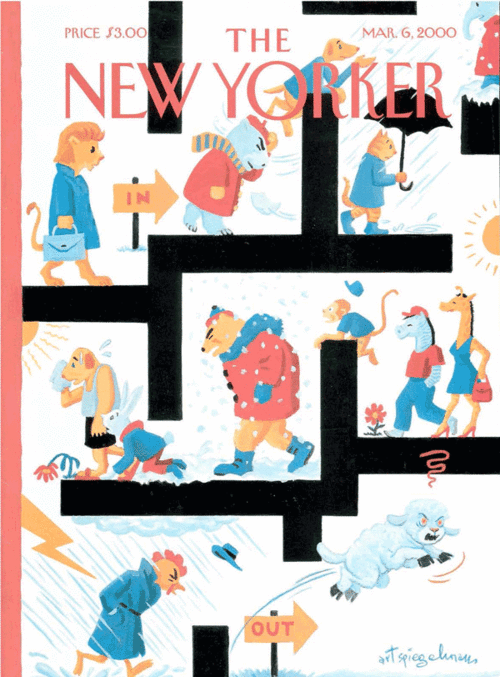

Unfolded, Anne Carson’s book length poem Nox is nearly 1000 inches long – or wide, to be exact.
An accordion-fold book housed in a clamshell box, Nox
is a single collage-like poem composed of dictionary entries,
snapshots, scraps of paper, postage stamps, written memories, and other
texts in which we see Carson as she copes with the death of her
brother, as she tries to comprehend “the smell of nothing,” “the
muteness,” and the meaning of memories scattered across a lifetime.
Just as the physical book unfolds and then collapses back into itself,
the unifying structure of Nox is the unfolding and collapsing of a short poem by the Roman poet Catullus. Nox opens with the poem – known as Poem 101 – in Latin. As you turn each page or further unfold the book (whichever way you choose to read Nox),
you are confronted with the individual dictionary entries for every
Latin word in Catullus’ poem. As the dictionary entries mount up and
you realize that Carson is working toward an English translation of the
poem, these entries induce a kind of literary vertigo. Each Latin word
has multiple definitions that can be wildly different from each other,
if not seemingly contradictory. The net effect is to make the reader
reel from the endless English permutations possible from sixty-three
Latin words.
Via sebald.wordpress.com, and one of my current reads...
Dukla is a small town close to the Carpathian Mountains. Dukla is a discontinuous set of descriptions of Dukla. Because the book bears the name of the place, the two seem to stand in some sort of relation. Perhaps the relation of Dukla to Dukla approaches the ‘pure’ form of what links a work to its object. But if so it’s a doubled relation, since reality is already relational. After all, Stasiuk’s subject is not so much Dukla as what Dukla reflects or refracts: what its reality relates to him. He doesn’t just look at a landscape; in so doing he looks through a lens at what makes a landscape possible (more...)
David Winters' splendid review of Andrzej Stasiuk's novel Dukla is up now on 3:AM.
In the autumn of 2000, I was a 20-year-old student in Cambridge, at home in the English language but new to England and the English. Producing dutiful but desiccated essays every week on regicide and gender-bending in Shakespeare, struggling meanwhile with the almost complete absence of rice and dal (“lentils”) in the British diet, I suddenly fell violently in love in an unlikely place – Galloway & Porter, a home for cut-price and remaindered books. Thankfully the object of my affections was, like Barkis, willing. She was, to squeeze out the last of my metaphor, The Novel.
Chandrahas Choudhury, an old pal of RSB, talks about Falling in love with the novel over at the Telegraph...
An interview with Mark Fisher over on More Thought:
“Since there are so many people who are depressed – and I maintain that the cause for much of this depression is social and political – then converting that depression into a political anger is an urgent political project....Anti-depressants and therapy are the opium of the masses now.” Mark Fisher
Interview with writer, theorist, and teacher Mark Fisher about his book Capitalist Realism: Is There No Alternative?
Called the most rapidly ascendant philosopher since Jacques Derrida, Quentin Meillassoux, the star pupil of Alain Badiou, has achieved something akin to cultish sainthood since the 2006 publication of his of his first book, After Finitude. And rightly so, given that his ideas inform the basis of speculative realism, one of the most hotly debated theoretical strains of the 21st century.
Yet, Meillassoux's theses—including his critique of 'correlationism', or the post-Kantian notion that being and thought are perpetually and inescapably intertwined—can be difficult to unpack. Helping us do that is Paul Ennis, editor of the journal Speculations and a recently graduated doctor of philosophy, whose explications of Meillassoux have been sanctioned by no less than the thinker himself.
Q: In Post-Continental Voices, you interview a number of post-Continental theorists about their intellectual and professional development, and their feelings about emergent philosophical strains. So, let me turn your own question back on you: What have been some of the formative influences on your academic maturation, and how did you become involved with speculative realism?
PE: When I started my Ph.D in 2007, I was treading a quite familiar path as far as my department was concerned (University College, Dublin). The plan was to write a thesis on Heidegger and ecological thinking, with a side-line in spatial/topological issues. For roughly two years, I was carrying out this project dutifully and was heavily influenced by the phenomenologists around me. For the most part, I was exposed to the Heideggerian version of phenomenology as ontology, as well as related offshoots of this tradition that stretch into Derrida and the weak theology of Caputo and others. Hermeneutics was also in the background, and I suspect my writing will always have something of this nexus in it.
The names that grabbed my attention during this time were Ed Casey, Stuart Elden, and Lee Braver. These are the kinds of thinkers I aspire to be like. Ed Casey revealed to me that phenomenology could still be carried out as method, rather than historical exegesis. Elden and Braver are master readers of other thinkers, and they are absolutely meticulous when doing so. I'm trying to get back to that way of writing after undergoing a bout of excitement that came with being released from a mental quagmire; more on this release in a moment.
In a more historical sense, I was fond of reading Dilthey and dipped into (the Heideggerian version of) Schelling. Hegel, due to the great respect he had amongst my peers, became quite important toward the tail end of my thesis. My thesis has its speculative crescendo, but the first two chapters lean heavily on Kant and Hegel. I'm not a Kantian or a Hegelian, but I know that the two form the broad hermeneutical horizon for what I do (more...)
The above via Fractured Politics. Paul Ennis received his doctorate from University College, Dublin in 2011. He is the author of Post-Continental Voices (2010) and Continental Realism (2011), as well as the editor of Speculations, a journal of speculative realism. Follow his blog at Another Heidegger Blog and on Twitter at twitter.com/lordwhatever.
Paul Celan is a limitless poet; a poet who requires our full attention, and our quiet patience. His dense, recondite work has challenged readers since the 1950s. His poetry keeps giving because, in truth, at first, it gives so little... For obvious reasons he sees through a glass darkly, but his shadow-drenched lens seems to disconcert and distort so much at first that we can't get a foothold on exactly what his poetry means.
But then we realise something. Celan's words are limpid, but appear so only if we adjust our expectations, allow his words to adjust our expectations: only if we are prepared to listen. Celan’s exactness clashes with what we think of as exact: the everyday is not exact, it is a cliché; realism requires vertiginous originality. But how can one be exact about what is truly unspeakable? One can only write knowing that one approaches and approximates, and that language fails you the while; you run after exactness, but the world gets away and your words fail. Beckett taught us about this failure because he knew failure and writing were synonymous.
I have a post over on the Carcanet blog, Celan and the Demand of Reading, written as a response to Correspondence: Paul Celan and Nelly Sachs which I've recently been reading, and thoroughly recommend.
It is a rather slight piece, for sure, but not too shoddy, I hope. For a much fuller recent post on Celan, let me direct you again to Stephen Mitchelmore's superb essay on The Meridian: Final Version–Drafts–Materials, by Paul Celan.
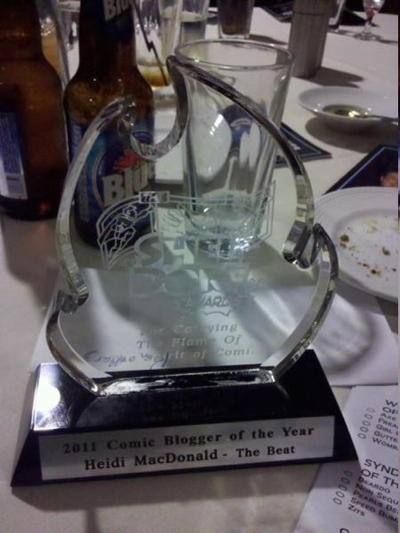
The Shel Dorf awards were given out this weekend at the Detroit Fanfare con, and while the complete winner list has not been posted anywhere we could find, we know we won for Best Comics Blogger! Woot! The competition was tough and to have prevailed is really humbling and gratifying. We don’t know who exactly voted on these awards, but whoever did — thank you so much.
Photo by Lauren Sankovitch.
View Next 25 Posts


















I confess… I’ve never heard of The Nib. But I’ll check ‘em out.
I tend to run a small circle in my industry news gathering. I figure *big* news makes it across the bow of every ship. The Beat has been a fav of mine for a long time. Perhaps I should venture out and see what others are doing.
Congrats on being one of the very top “only comics” blogs. The others are too wide-ranging for me.
Speaking as one of the owners, I’m always happy to see IndyPlanet.com get a little attention. But, um … it’s not a blog, nor a news site. It’s a print-on-demand and/or digital download order fulfillment site for independent comics. Still, #25 … I’ll take it.
Using Alexa rankings are a little meaningless for this when you factor in things like The Nib which are part of a larger network. The ranking comes from the top level domain (medium.com) rather than a sub-directory. Not that The Nib might not have been up at the top anyway. There’s a wide gap in Alexa rankings between the first two places on that list. That’s just one of the reasons this list is all quantitative and not qualitative.
Never heard of The Nib, either.
Anyway,my go-to sites; The Beat, CBR, Bleeding Cool, Comics Reporter, Multiversity, Comics Alliance, Graphixia, Hooded Utilitarian, Comics Journal, Talking Comics, Ghetto Manga
WOW, are they missing sites.
Subscribed: Beat, BC, NCRL, lots of creator blogs (kudos to Todd Klein for being in there)
Unsubscribed quite a while back: Comics Reporter, Robot 6
Visit only when linked to: Comics Alliance, CBR, everything else
I’ve only been to about six of these sites. I’ve got about 40 bookmarked blogs of which about 15 are artist sites. It doesn’t look like alot of these are truly comic book blogs. More like multi media blogs that include comicbooks. I’ll definately check out some of these but I doubt most will make my book mark list. Never heard of Nibs either.
I’ve been following Heidi since before there were PC’s! Hey, kids comics!!
I saw this first elsewhere, and this is the first time I’ve heard any other comics blog I read talk about The Nib with familiarity. I’ve never heard of it.
Hello,
For comics news I tend to go to CBR and The Beat. I dig Comic Book Legends on CBR the general niceness of The Beat. I’m a sucker for the epic length interviews on Word Balloon and I regularly hunt down interviews with comic creators at a menagerie of sites.
I never leave comments on sites, but there is a nice vibe here.
Goodbye,
Jonny
Bleeding Cool, Robot 6, ICV2
On occasion:
Mary Sue, Comics Alliance, Comics Should Be Good, CBR
Where’s my blog? Kidding! I’ve never been to the Nib and am unfamiliar with the majority of these sites. But I will definitely check them out. Congrats, Beat!